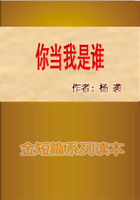'The next voyage he proceeded so farre that with much labour by cutting of trees in sunder he made his passage, but when his Barge could passe no farther, he left her in a broad bay out of danger of shot, commanding none should go ashore till his returne; himselfe with 2 English and two Salvages went up higher in a Canowe, but he was not long absent, but his men went ashore, whose want of government gave both occasion and opportunity to the Salvages to surprise one George Casson, and much failed not to have cut of the boat and all the rest.Smith little dreaming of that accident, being got to the marshes at the river's head, 20 miles in the desert, had his 2 men slaine (as is supposed) sleeping by the Canowe, whilst himselfe by fowling sought them victual, who finding he was beset by 200 Salvages, 2 of them he slew, stil defending himselfe with the aid of a Salvage his guid (whome bee bound to his arme and used as his buckler), till at last slipping into a bogmire they tooke him prisoner: when this news came to the fort much was their sorrow for his losse, fewe expecting what ensued.A month those Barbarians kept him prisoner, many strange triumphs and conjurations they made of him, yet he so demeaned himselfe amongst them, as he not only diverted them from surprising the Fort, but procured his own liberty, and got himselfe and his company such estimation amongst them, that those Salvages admired him as a demi-God.So returning safe to the Fort, once more staied the pinnas her flight for England, which til his returne could not set saile, so extreme was the weather and so great the frost."The first allusion to the salvation of Captain Smith by Pocahontas occurs in a letter or "little booke" which he wrote to Queen Anne in 1616, about the time of the arrival in England of the Indian Princess, who was then called the Lady Rebecca, and was wife of John Rolfe, by whom she had a son, who accompanied them.Pocahontas had by this time become a person of some importance.Her friendship had been of substantial service to the colony.Smith had acknowledged this in his "True Relation," where he referred to her as the "nonpareil" of Virginia.He was kind-hearted and naturally magnanimous, and would take some pains to do the Indian convert a favor, even to the invention of an incident that would make her attractive.To be sure, he was vain as well as inventive, and here was an opportunity to attract the attention of his sovereign and increase his own importance by connecting his name with hers in a romantic manner.Still, we believe that the main motive that dictated this epistle was kindness to Pocahontas.The sentence that refers to her heroic act is this: "After some six weeks [he was absent only four weeks] fatting amongst those Salvage Countries, at the minute of my execution she hazarded the beating out of her own braines to save mine, and not only that, but so prevailed with her father [of whom he says, in a previous paragraph, "I received from this great Salvage exceeding great courtesie"], that I was safely conducted to Jamestown."This guarded allusion to the rescue stood for all known account of it, except a brief reference to it in his "New England's Trials" of 1622, until the appearance of Smith's "General Historie " in London, 1624.In the first edition of "New England's Trials," 1620, there is no reference to it.In the enlarged edition of 1622, Smith gives a new version to his capture, as resulting from "the folly of them that fled," and says: "God made Pocahontas, the King's daughter the means to deliver me."The "General Historie " was compiled--as was the custom in making up such books at the time from a great variety of sources.Such parts of it as are not written by Smith--and these constitute a considerable portion of the history--bear marks here and there of his touch.It begins with his description of Virginia, which appeared in the Oxford tract of 1612; following this are the several narratives by his comrades, which formed the appendix of that tract.The one that concerns us here is that already quoted, signed Thomas Studley.
It is reproduced here as "written by Thomas Studley," the first Cape Merchant in Virginia, Robert Fenton, Edward Harrington, and I.S."[John Smith].It is, however, considerably extended, and into it is interjected a detailed account of the captivity and the story of the stones, the clubs, and the saved brains.
It is worthy of special note that the "True Relation" is not incorporated in the "General Historie." This is the more remarkable because it was an original statement, written when the occurrences it describes were fresh, and is much more in detail regarding many things that happened during the period it covered than the narratives that Smith uses in the " General Historie." It was his habit to use over and over again his own publications.Was this discarded because it contradicted the Pocahontas story--because that story could not be fitted into it as it could be into the Studley relation?
It should be added, also, that Purchas printed an abstract of the Oxford tract in his "Pilgrimage," in 1613, from material furnished him by Smith.The Oxford tract was also republished by Purchas in his "Pilgrimes," extended by new matter in manuscript supplied by Smith.The "Pilgrimes" did not appear till 1625, a year after the "General Historie," but was in preparation long before.The Pocahontas legend appears in the "Pilgrimes," but not in the earlier "Pilgrimage."We have before had occasion to remark that Smith's memory had the peculiarity of growing stronger and more minute in details the further he was removed in point of time from any event he describes.
The revamped narrative is worth quoting in full for other reasons.
It exhibits Smith's skill as a writer and his capacity for rising into poetic moods.This is the story from the "General Historie":














